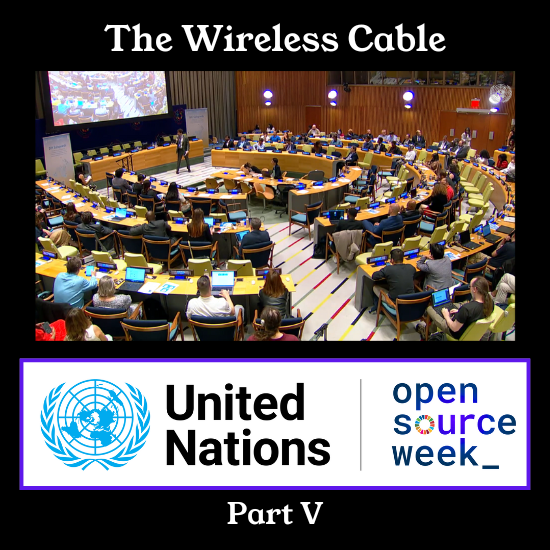
Drone Warfare Redefined: Ukraine’s Operation Spiderweb and the Future of War
Operation Spiderweb marked a turning point in the war between Ukraine and Russia. Using dozens of small drones launched from inside Russian territory, Ukraine managed to strike deep into military air bases and damage key bombers. This post explores how the operation worked, why it caught Russia off guard, and what it reveals about the future of warfare in a connected world.

(101 Series: Geopolitics) Geopolitics 101: How Power Operates in a Connected World
A clear, accessible guide to how geopolitics works today. From territory and tech to sanctions and supply chains, this piece breaks it down for readers in tech, policy, and beyond.

UN Open Source Week 2025, Part V. Recap: Trust, Sovereignty, and the Future of DPI
What did UN Open Source Week 2025 reveal about building digital infrastructure we can trust? In this final recap, we reflect on hackathons, open source governance, and DPI as a social contract, surfacing tensions and lessons ahead of the Global DPI Summit in Cape Town.

UN Open Source Week 2025. Part IV: Building DPI We Can Trust
At UN Open Source Week 2025, the DPI side panel track showed how open source frameworks become trusted, inclusive infrastructure. From payment systems in Africa to civic tech in Barcelona and safeguards for rights. Here’s what it takes to build DPI that serves people.

UN Open Source Week 2025. Part III. DPI in Practice: Trust, Sovereignty, and the Push for Inclusive Infrastructure
At UN Open Source Week 2025, trust, sovereignty, and safeguards took center stage as countries shared how Digital Public Infrastructure can drive inclusion while protecting rights. Here’s how DPI can move from promise to practical, people-centered systems.

UN Open Source Week 2025. Part II: OSPOs for Good, Institutional Shifts, and the Architecture of Trust
OSPOs are moving from niche to necessary. Part II of our UN Open Source Week series covers how governments, nonprofits, and the private sector are building trust through open source: from interoperability to digital public infrastructure.

UN Open Source Week 2025. Part I: Hackathons, Labor Shifts, and AI in the Public Interest
From debugging at the UN to debating the future of work at LinkedIn, UN Open Source Week kicked off with code, community, and questions worth asking.

UN Open Source Week 2025: What to Expect at the Digital Frontier
What does the future of digital infrastructure look like, and who gets to build it? From June 16 to 20, 2025, the UN will host its flagship Open Source Week in New York. This year’s agenda covers OSPOs, AI ethics, sovereign tech, and Digital Public Infrastructure (DPI), featuring speakers from governments, tech communities, and civil society. The Wireless Cable previews the full week, including a case study by our Editor-in-Chief on biometric risks in DPI.

The Most Devastating Confidentiality Breaches in History
What do a rogue sysadmin, a baby monitor, and a trove of leaked intelligence files have in common? They each reveal a different face of confidentiality failure. In this remastered post, we break down four types of breaches that continue to haunt businesses and governments alike; distilling lessons from real-world examples and showing why confidentiality still anchors cybersecurity today.

(101 Series: CIA Triad) Understanding the CIA Triad: The Foundation of Cybersecurity
Explore the CIA Triad, a foundational concept in cybersecurity that encompasses the principles of Confidentiality, Integrity, and Availability. This comprehensive guide delves into each element, providing real-world examples and practical measures for protecting sensitive data in organizations.

(101 Series: DPI) Safeguarding Digital Public Infrastructure: Protecting Public Trust in the Digital Age
As governments digitize everything from ID systems to public services, a critical question looms: who protects the public from digital overreach? In this deep dive, we explore what DPI Safeguards are, why they matter, and how they can uphold trust, rights, and institutional integrity in the digital age.

How to Manage an AI Black Swan
Artificial General Intelligence (AGI) will change the world faster than we can imagine—and possibly faster than we can control. In this guest essay, Kamran Balayev calls for urgent safeguards to ensure humanity remains at the helm.

The U.S. vs. Google (II): Between a Historic Ruling and the Risk of Regulatory Simulation
A historic ruling against Google marks a turning point in U.S. tech regulation—but will it lead to real change or simply reinforce the illusion of accountability? In this follow-up to our original analysis, we break down what the court decided, how the DOJ responded, and what’s really at stake for the digital economy.

5 Key Concepts to Understand Cloud Security (and Why They Matter Today)
Cloud security isn’t just for engineers—it affects everyone. From shared responsibility to encryption, here are 5 key concepts that explain how the cloud is secured, who’s responsible for what, and why it matters now more than ever.

What to Expect in 2025: Cybersecurity, Geopolitics, and the Digital World
As 2025 kicks off, the geopolitical and digital landscapes are already shifting. From regulatory battles over AI and cybersecurity to Musk and Trump’s growing influence in tech policy, this year promises to redefine global power structures. What’s next for cybersecurity threats, digital sovereignty, and platforms like TikTok? We break down the key trends shaping the year ahead.

A Year in Review – Navigating the Digital Frontier in 2024
2024 has shown us the growing ties between technology, geopolitics, and cybersecurity. As we reflect on the year's defining moments, from antitrust battles to cyber espionage and social media clashes, The Wireless Cable explores what these events mean for the digital frontier.

United States vs. Google: The Landmark Antitrust Case of the Decade
In a landmark antitrust case, the U.S. Department of Justice takes on Google, challenging its dominance in digital search and online advertising. This analysis explores the key arguments, potential outcomes, and global implications of a legal battle that could reshape the tech industry.

Salt Typhoon: Unmasking a New Era of Cyber Espionage on Election Day
In an era where digital information flows freely, the emergence of cyber threats like Salt Typhoon presents significant challenges to national security and the integrity of democratic processes. This article delves into the activities of the Salt Typhoon group, exploring their methods, implications for U.S.-China relations, and the urgent need for robust cybersecurity measures to protect sensitive information from espionage.

(101 Series: GDPR) The GDPR, and What We Don't Realize About Data Protection
This article dives into the impact of the GDPR on data protection and explores its effectiveness in safeguarding our digital lives. We discuss the often-overlooked importance of cybersecurity and how regulatory frameworks like GDPR shape, but do not fully secure, our online world.

(101 Series: Cybersecurity) Cybersecurity, a History: From Undefined Term to Critical Global Issue
As cybersecurity has evolved from a technical term to a cornerstone of global politics, its significance in international relations is undeniable. In this article, we explore the complex journey of cybersecurity, from its early origins to its growing role in shaping statecraft and international cooperation, highlighting how cyber threats are redefining power in the digital age.

